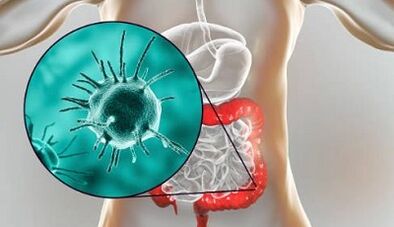
Parasitic diseases are a wide group of diseases caused by helmintha, some arthropods and protozoac.
Despite all the achievements of modern medicine and developed hygiene, according to statistics, about 90% of people around the world at least once in their lives faces these pathologies.How to doubt the disease, and what tests for parasites to pass, you can find out from this article.
Types of parasites
Parasites are called organisms that survive due to vital activities of living beings.Located in the human body, they in the process of their growth and reproduction lead to lack of elements in traces, vitamins, proteins and other nutrients.They can also lead to relapse and deterioration of chronic pathology, and inflict damage to the internal authorities themselves.
There are the following types of parasites that can cause diseases in humans:
- Protozoa (Amebas, Lamlika);
- Pathogenic microorganisms (chlamydia, mycoplasms and others);
- Helminths (ascarids, pinworms, bull and pork chain and so on);
- Parasitic arthropod (scabies, demodex).
The main feature of pathology caused by them is a long-berm asymptomatic or low-limmomic course.Parasites skillfully hide their existence, trying to "disembark the owner from the body" until his reserves are exhausted, and the organ or tissue is severely damaged.
Symptoms of parasitic diseases
Parasitic pathologies are most commonly intended for helminthiasis - diseases caused by the presence of worms in the body.In most cases, they are in children, however, they can develop in adults in the event of neglect of hygiene rules.Long after the infection do not manifest in any way or are accompanied by inconspicuous symptoms that often remain without attention.

Each disease is characterized by certain characteristics, but there are common signs:
- Headaches, dizziness, increased weakness and fatigue.These manifestations are a consequence of intoxication arising from the poisoning of the wastewater of the parasites.
- Deterioration of bronchial asthma and allergic rhinitis, dermatitis, urticaria.Are due to increased sensitivity to chemical cells and their excreted products.
- Digestive system dysfunction (abdominal pain, nausea, vomiting, heartburn, prison and diarrhea).Helminths parasure in the intestinal luman, lead to inflammation and intestinal obstruction due to the hose lumen blockade.
- Anemia, lack of vitamins, weight loss.It occurs due to the lack of proteins, vitamins and microelements, reduced hormone production.
- Sleeping, chronic fatigue, irritability, nervousness, muscle pain and joints.
To reveal most of the kinds of Hermimans, it is necessary to conduct a test of a chair or donate blood for the presence of certain antibodies.You can undergo a test at the clinic at your place of residence, after receiving the hospital, as well as in any of the private laboratories.Some medical centers offer an extensive review, during which you can diagnose the presence or absence of several types of parasites in the body.
Tests for parasites

A doctor who attends will tell you which tests you have to take if you suspect parasitic disease based on complaints, medical history and clinical manifestations of the disease.
The diagnosis begins with a general blood test.The most needed Helminthiasis changes will be:
- Reduced hemoglobin levels and reduction in the number of red blood cells (occurs due to the lack of protein and iron).
- Increasing the number of leukocytes, ESR acceleration (signs are inflammation of internal organs, especially the gastrointestinal tract).
- Increasing the eosinophil (characteristic sign of allergy that occurs in response to the irritating effects of Helminth waste products).
For a precise diagnosis, an analysis of the chair for harmonious eggs and glass is used.When examining the feces, you can detect pathogens enterijations, ascariasis, hymenolipedosis and detect the presence of protozoan microorganisms (Giardia).
It is important to remember that with one test the probability of detecting the wrong eggs in the feces of 30%.Therefore, that a banddown diagnosis, with the first negative result, is performed twice with an interval of 2-4 days.
To increase the accuracy of the study, it is important to be carefully prepared for the submission of a chair for analysis.Biological material should be collected only in a special sterile tank that can be purchased in the pharmacy.A few days before the test you should stop eating food that spots (beets, red berries, exotic fruits, sweets and drinks with colors) and do not use laxatives or rectal composers.
Enzyme immunoasay
The use of ELISA analysis in adults and children is possible to reveal antibodies that produce a human body in response to the presence of foreign facilities in it.To do this, the blood from the vein can be discovered, in which in the laboratory, the specific Iggs of Antibodies to Giardie, Trichomon, Pork and Cattle, can detect.Using this study, you can discover the presence of almost all parasites in the human body.
Preparation for the study is not difficult.The test must be taken in the morning, on an empty stomach after fast 8-10 hours.Notice the study is advisable not to take antibacterial and antihistamic drugs, and not eating allergen food (honey, seafood, exotic fruits and red berries, nuts).Just before donating blood, experts recommend a holiday in the Laboratory waiting room for 10-15 minutes.
The results of the study become famous after 1-2 days.These studies are also implemented as a primary diagnosis and as control over the treatment.
Timely detection and modern effective treatment of parasitic diseases allows you to avoid complications dangerous to health.



























